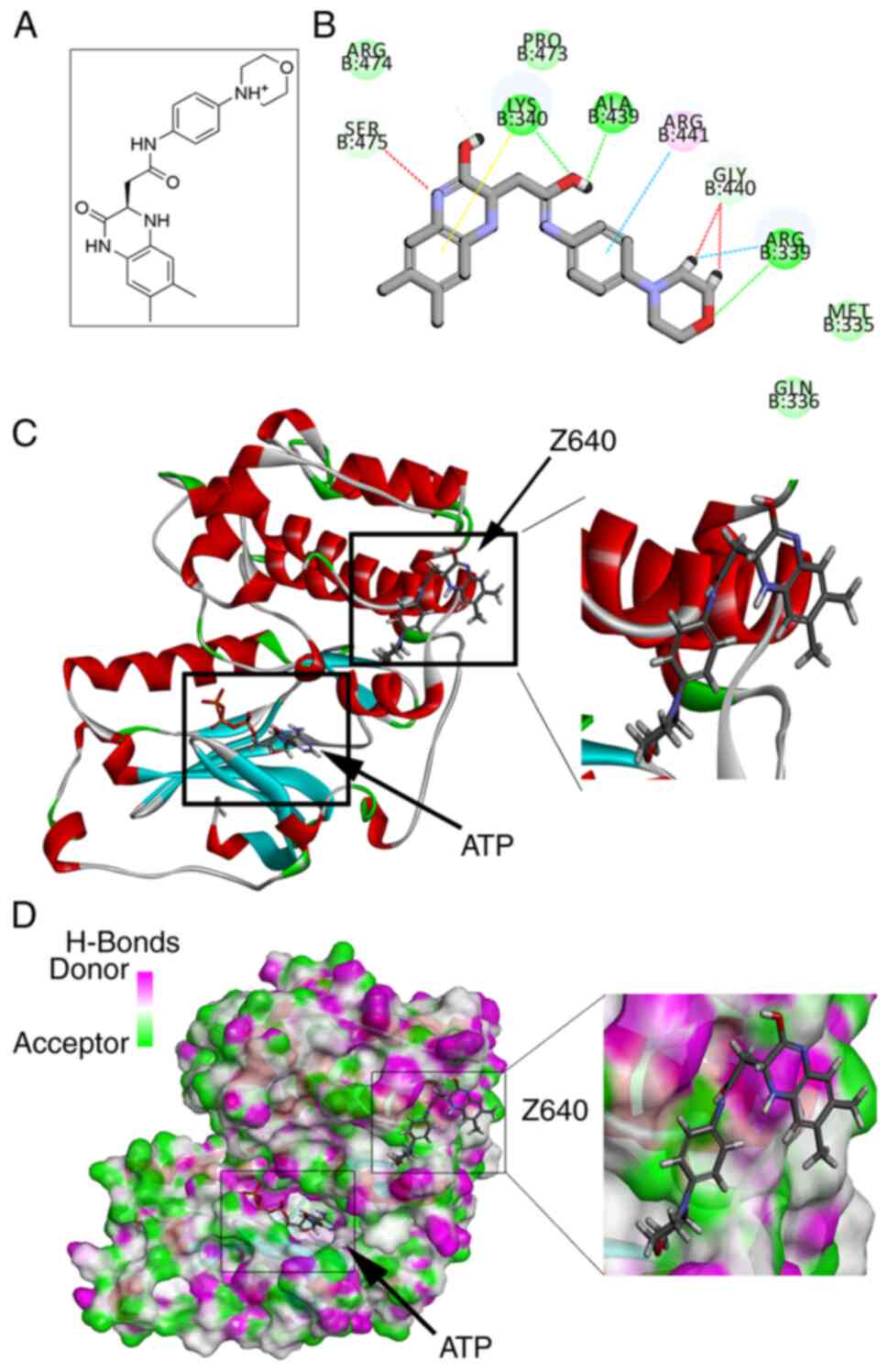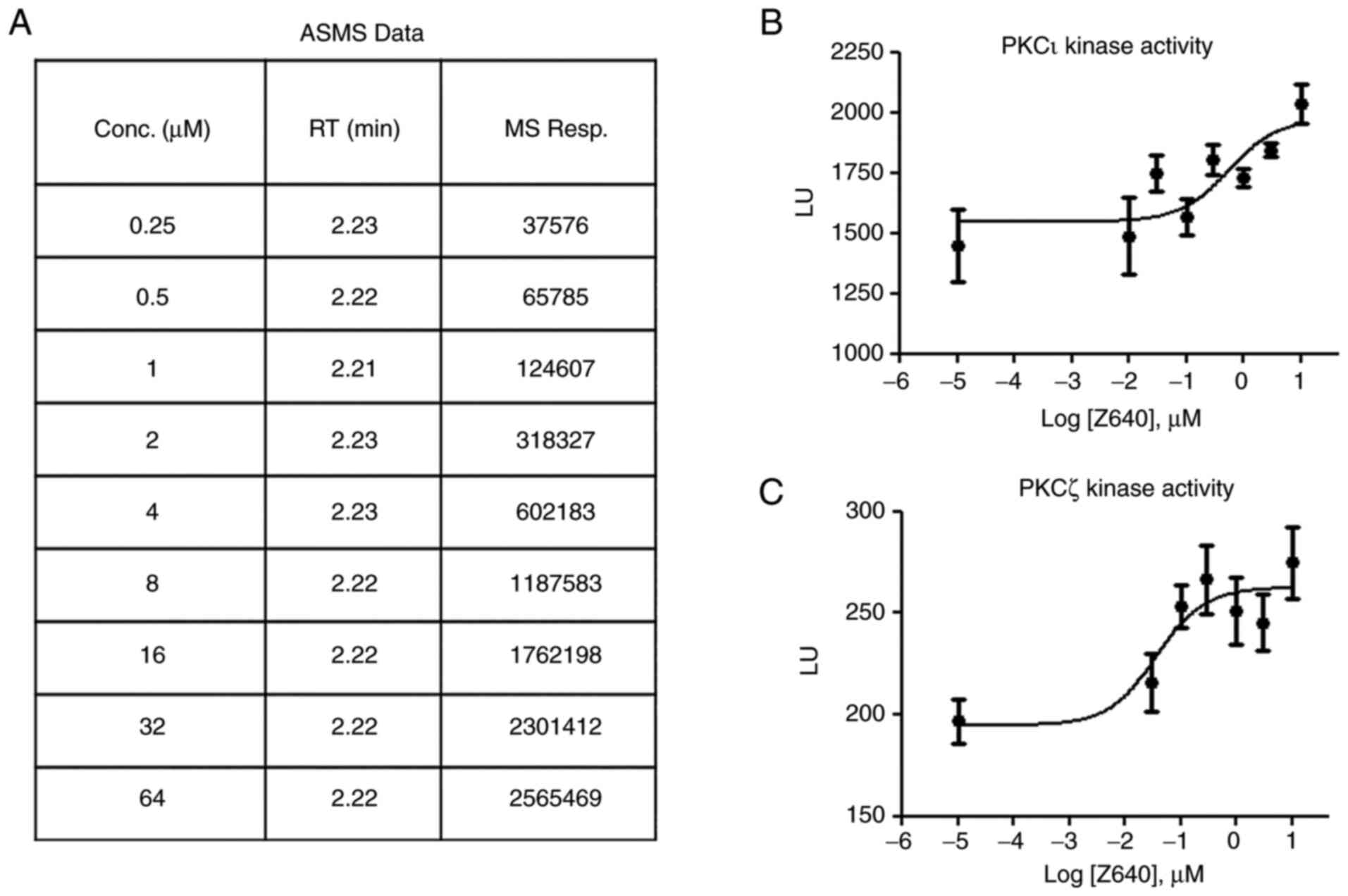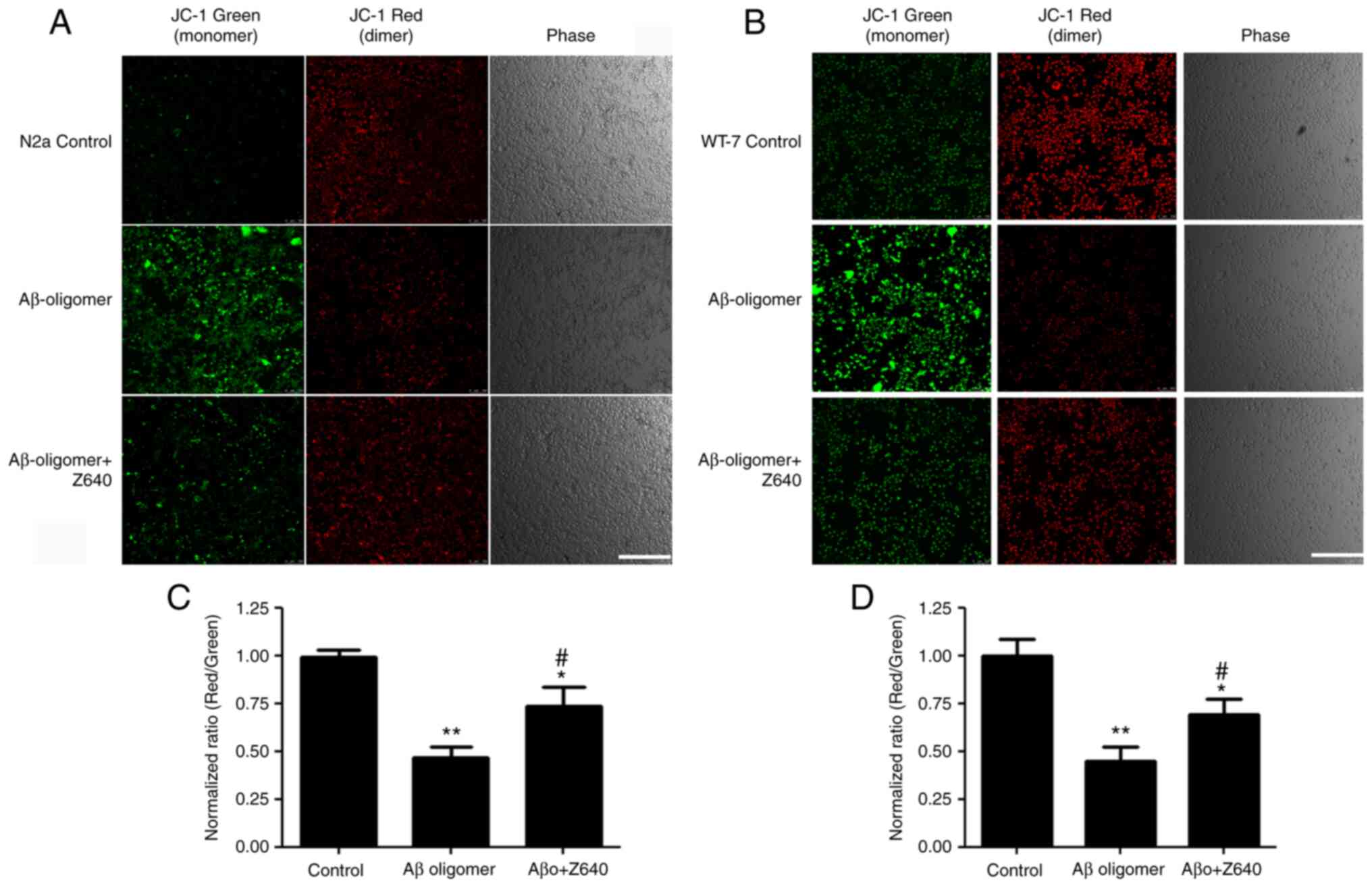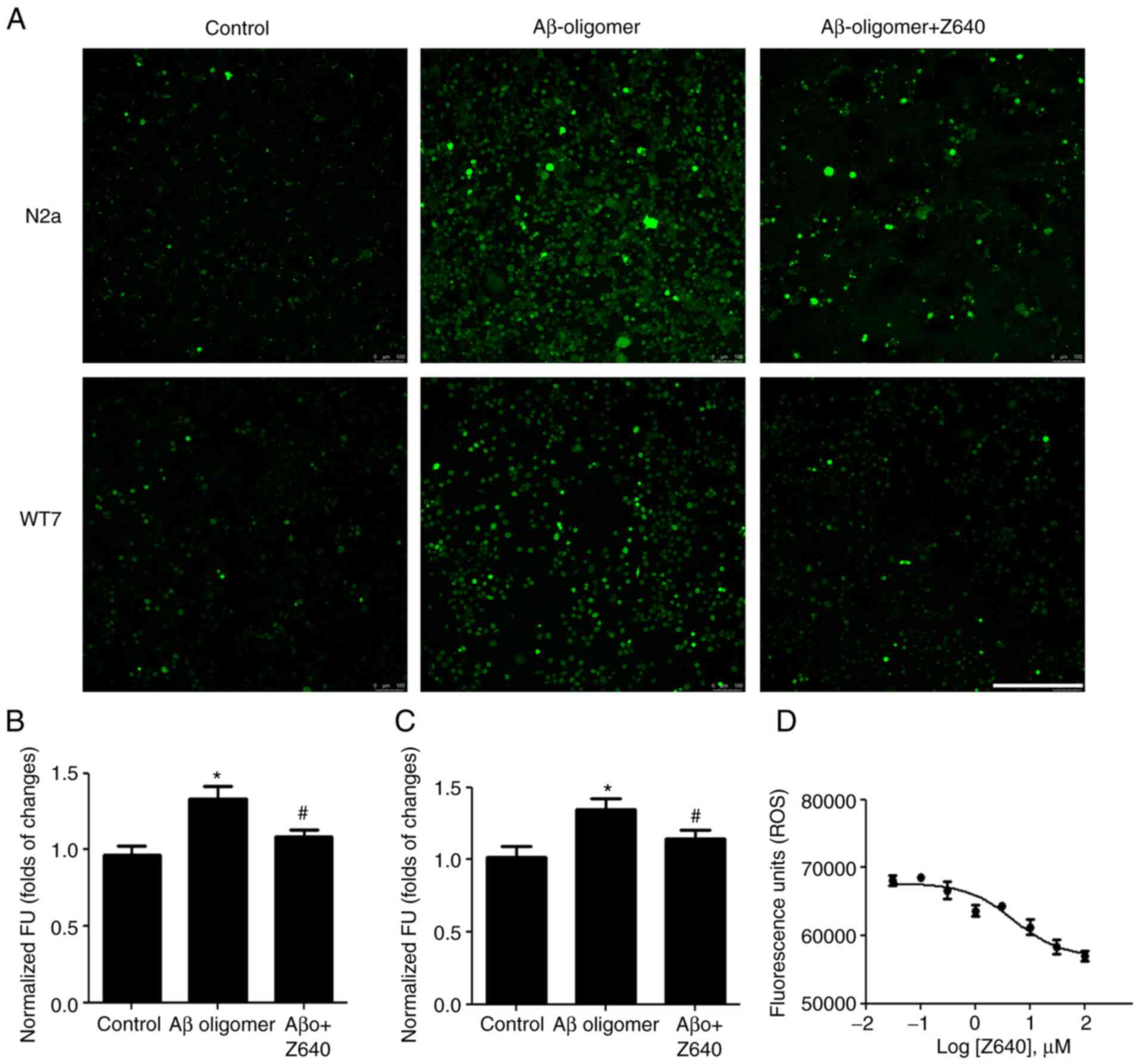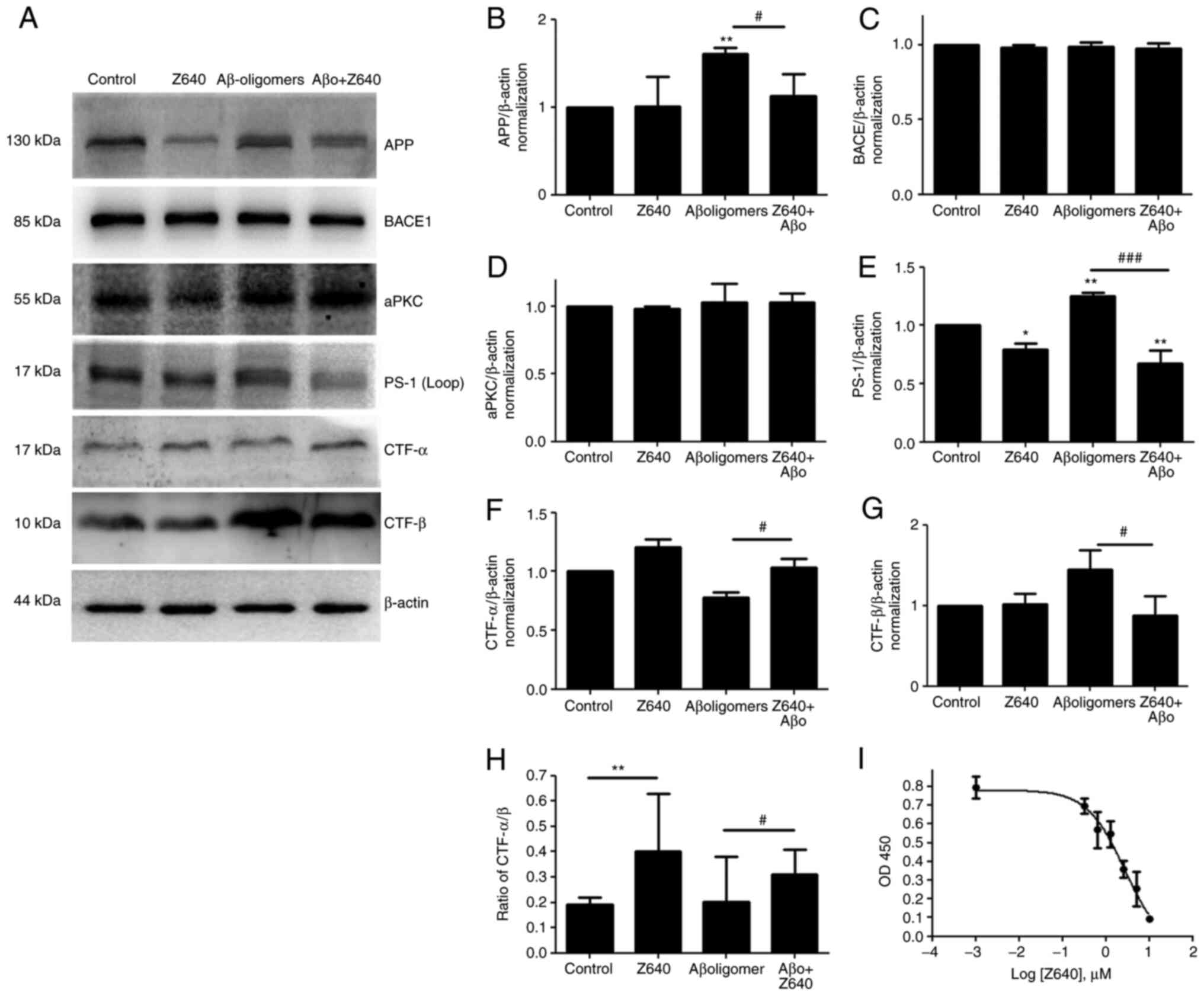|
1
|
Breitkreutz D, Braiman-Wiksman L, Daum N,
Denning MF and Tennenbaum T: Protein kinase C family: On the
crossroads of cell signaling in skin and tumor epithelium. J Cancer
Res Clin Oncol. 133:793–808. 2007. View Article : Google Scholar : PubMed/NCBI
|
|
2
|
Moscat J, Diaz-Meco MT and Wooten MW: Of
the atypical PKCs, Par-4 and p62: Recent understandings of the
biology and pathology of a PB1-dominated complex. Cell Death
Differ. 16:1426–1437. 2009. View Article : Google Scholar : PubMed/NCBI
|
|
3
|
Gunaratne A and Di Guglielmo GM: Par6 is
phosphorylated by aPKC to facilitate EMT. Cell Adh Migr. 7:357–361.
2013. View Article : Google Scholar : PubMed/NCBI
|
|
4
|
Horikoshi Y, Suzuki A, Yamanaka T, Sasaki
K, Mizuno K, Sawada H, Yonemura S and Ohno S: Interaction between
PAR-3 and the aPKC-PAR-6 complex is indispensable for apical domain
development of epithelial cells. J Cell Sci. 122:1595–1606. 2009.
View Article : Google Scholar : PubMed/NCBI
|
|
5
|
Golub O, Wee B, Newman RA, Paterson NM and
Prehoda KE: Activation of Discs large by aPKC aligns the mitotic
spindle to the polarity axis during asymmetric cell division.
Elife. 6:e321372017. View Article : Google Scholar : PubMed/NCBI
|
|
6
|
Selbie LA, Schmitz-Peiffer C, Sheng Y and
Biden TJ: Molecular cloning and characterization of PKC iota, an
atypical isoform of protein kinase C derived from insulin-secreting
cells. J Biol Chem. 268:24296–24302. 1993. View Article : Google Scholar : PubMed/NCBI
|
|
7
|
Tobias IS, Kaulich M, Kim PK, Simon N,
Jacinto E, Dowdy SF, King CC and Newton AC: Protein kinase Cζ
exhibits constitutive phosphorylation and
phosphatidylinositol-3,4,5-triphosphate-independent regulation.
Biochem J. 473:509–523. 2016. View Article : Google Scholar : PubMed/NCBI
|
|
8
|
McCaffrey LM and Macara IG: The Par3/aPKC
interaction is essential for end bud remodeling and progenitor
differentiation during mammary gland morphogenesis. Genes Dev.
23:1450–1460. 2009. View Article : Google Scholar : PubMed/NCBI
|
|
9
|
Kajimoto T, Caliman AD, Tobias IS, Okada
T, Pilo CA, Van AN, Andrew McCammon J, Nakamura SI and Newton AC:
Activation of atypical protein kinase C by sphingosine 1-phosphate
revealed by an aPKC-specific activity reporter. Sci Signal.
12:eaat66622019. View Article : Google Scholar : PubMed/NCBI
|
|
10
|
Tsai LC, Xie L, Dore K, Xie L, Del Rio JC,
King CC, Martinez-Ariza G, Hulme C, Malinow R, Bourne PE and Newton
AC: Zeta inhibitory peptide disrupts electrostatic interactions
that maintain atypical protein kinase C in its active conformation
on the scaffold p62. J Biol Chem. 290:21845–21856. 2015. View Article : Google Scholar : PubMed/NCBI
|
|
11
|
Ozdamar B, Bose R, Barrios-Rodiles M, Wang
HR, Zhang Y and Wrana JL: Regulation of the polarity protein Par6
by TGFbeta receptors controls epithelial cell plasticity. Science.
307:1603–1609. 2005. View Article : Google Scholar : PubMed/NCBI
|
|
12
|
Aranda V, Haire T, Nolan ME, Calarco JP,
Rosenberg AZ, Fawcett JP, Pawson T and Muthuswamy SK: Par6-aPKC
uncouples ErbB2 induced disruption of polarized epithelial
organization from proliferation control. Nat Cell Biol.
8:1235–1245. 2006. View
Article : Google Scholar : PubMed/NCBI
|
|
13
|
Chalmers AD, Pambos M, Mason J, Lang S,
Wylie C and Papalopulu N: aPKC, Crumbs3 and Lgl2 control apicobasal
polarity in early vertebrate development. Development. 132:977–986.
2005. View Article : Google Scholar : PubMed/NCBI
|
|
14
|
Hartmann S, Ridley AJ and Lutz S: The
function of Rho-associated kinases ROCK1 and ROCK2 in the
pathogenesis of cardiovascular disease. Front Pharmacol. 6:2762015.
View Article : Google Scholar : PubMed/NCBI
|
|
15
|
Chen YM, Wang QJ, Hu HS, Yu PC, Zhu J,
Drewes G, Piwnica-Worms H and Luo ZG: Microtubule
affinity-regulating kinase 2 functions downstream of the
PAR-3/PAR-6/atypical PKC complex in regulating hippocampal neuronal
polarity. Proc Natl Acad Sci USA. 103:8534–8539. 2006. View Article : Google Scholar : PubMed/NCBI
|
|
16
|
Yoshihama Y, Chida K and Ohno S: The
KIBRA-aPKC connection: A potential regulator of membrane
trafficking and cell polarity. Commun Integr Biol. 5:146–151. 2012.
View Article : Google Scholar : PubMed/NCBI
|
|
17
|
Amini N, Azad RR, Motamedi F,
Mirzapour-Delavar H, Ghasemi S, Aliakbari S and Pourbadie HG:
Overexpression of protein kinase Mζ in the hippocampus mitigates
Alzheimer's disease-related cognitive deficit in rats. Brain Res
Bull. 166:64–72. 2021. View Article : Google Scholar : PubMed/NCBI
|
|
18
|
Crary JF, Shao CY, Mirra SS, Hernandez AI
and Sacktor TC: Atypical protein kinase C in neurodegenerative
disease I: PKMzeta aggregates with limbic neurofibrillary tangles
and AMPA receptors in Alzheimer disease. J Neuropathol Exp Neurol.
65:319–326. 2006. View Article : Google Scholar : PubMed/NCBI
|
|
19
|
Patel H and Zamani R: The role of PKMζ in
the maintenance of long-term memory: A review. Rev Neurosci.
32:481–494. 2021. View Article : Google Scholar : PubMed/NCBI
|
|
20
|
Yao Y, Kelly MT, Sajikumar S, Serrano P,
Tian D, Bergold PJ, Frey JU and Sacktor TC: PKM zeta maintains late
long-term potentiation by N-ethylmaleimide-sensitive
factor/GluR2-dependent trafficking of postsynaptic AMPA receptors.
J Neurosci. 28:7820–7827. 2008. View Article : Google Scholar : PubMed/NCBI
|
|
21
|
Sun M and Zhang H: Par3 and aPKC regulate
BACE1 endosome-to-TGN trafficking through PACS1. Neurobiol Aging.
60:129–140. 2017. View Article : Google Scholar : PubMed/NCBI
|
|
22
|
Bogard AS and Tavalin SJ: Protein kinase C
(PKC)ζ pseudosubstrate inhibitor peptide promiscuously binds PKC
family isoforms and disrupts conventional PKC targeting and
translocation. Mol Pharmacol. 88:728–735. 2015. View Article : Google Scholar : PubMed/NCBI
|
|
23
|
Chen C, Lu Y, Siu HM, Guan J, Zhu L, Zhang
S, Yue J and Zhang L: Identification of novel vacuolin-1 analogues
as autophagy inhibitors by virtual drug screening and chemical
synthesis. Molecules. 22:8912017. View Article : Google Scholar : PubMed/NCBI
|
|
24
|
Andrews CL, Ziebell MR, Nickbarg E and
Yang X: Mass Spectrometry-Based Screening and Characterization of
Protein-Ligand Complexes in Drug Discovery. Protein and Peptide
Mass Spectrometry in Drug Discovery. 253–286. 2011. View Article : Google Scholar
|
|
25
|
Annis DA, Athanasopoulos J, Curran PJ,
Felsch JS, Kalghatgi K, Lee WH, Nash HM, Orminati JPA, Rosner KE,
Shipps GW Jr, et al: An affinity selection-mass spectrometry method
for the identification of small molecule ligands from self-encoded
combinatorial libraries: Discovery of a novel antagonist of E.
coli dihydrofolate reductase. Int J Mass Spectrom. 238:77–83.
2004. View Article : Google Scholar
|
|
26
|
Annis A, Chuang CC and Nazef N: ALIS: An
Affinity Selection-Mass Spectrometry System for the Discovery and
Characterization of Protein-Ligand Interactions. Mass Spectrometry
in Medicinal Chemistry: Applications in Drug Discovery. 121–156.
2007. View Article : Google Scholar
|
|
27
|
Sajan MP, Hansen BC, Higgs MG, Kahn CR,
Braun U, Leitges M, Park CR, Diamond DM and Farese RV: Atypical
PKC, PKCλ/ι, activates β-secretase and increases
Aβ1−40/42 and phospho-tau in mouse brain and isolated
neuronal cells, and may link hyperinsulinemia and other aPKC
activators to development of pathological and memory abnormalities
in Alzheimer's disease. Neurobiol Aging. 61:225–237. 2018.
View Article : Google Scholar : PubMed/NCBI
|
|
28
|
Etcheberrigaray R, Tan M, Dewachter I,
Kuipéri C, Van der Auwera I, Wera S, Qiao L, Bank B, Nelson TJ,
Kozikowski AP, et al: Therapeutic effects of PKC activators in
Alzheimer's disease transgenic mice. Proc Natl Acad Sci USA.
101:11141–11146. 2004. View Article : Google Scholar : PubMed/NCBI
|
|
29
|
Sun M, Zhou T, Zhou L, Chen Q, Yu Y, Yang
H, Zhong K, Zhang X, Xu F, Cai S, et al: Formononetin protects
neurons against hypoxia-induced cytotoxicity through upregulation
of ADAM10 and sAβPPα. J Alzheimers Dis. 28:795–808. 2012.
View Article : Google Scholar : PubMed/NCBI
|
|
30
|
Yu J, Sun M, Chen Z, Lu J, Liu Y, Zhou L,
Xu X, Fan D and Chui D: Magnesium modulates amyloid-beta protein
precursor trafficking and processing. J Alzheimers Dis.
20:1091–1106. 2010. View Article : Google Scholar : PubMed/NCBI
|
|
31
|
Cline EN, Bicca MA, Viola KL and Klein WL:
The amyloid-β oligomer hypothesis: Beginning of the third decade. J
Alzheimers Dis. 64 (Suppl 1):S567–S610. 2018. View Article : Google Scholar : PubMed/NCBI
|
|
32
|
Sun M, Huang CY, Wang H and Zhang HY: Par3
regulates polarized convergence between APP and BACE1 in
hippocampal neurons. Neurobiol Aging. 77:87–93. 2019. View Article : Google Scholar : PubMed/NCBI
|
|
33
|
Rolland M, Powell R, Jacquier-Sarlin M,
Boisseau S, Reynaud-Dulaurier R, Martinez-Hernandez J, André L,
Borel E, Buisson A and Lanté F: Effect of Aβ oligomers on neuronal
APP triggers a vicious cycle leading to the propagation of synaptic
plasticity alterations to healthy neurons. J Neurosci.
40:5161–5176. 2020. View Article : Google Scholar : PubMed/NCBI
|
|
34
|
Schützmann MP, Hasecke F, Bachmann S,
Zielinski M, Hänsch S, Schröder GF, Zempel H and Hoyer W:
Endo-lysosomal Aβ concentration and pH trigger formation of Aβ
oligomers that potently induce tau missorting. Nat Commun.
12:46342021. View Article : Google Scholar : PubMed/NCBI
|
|
35
|
Zhang H, Neimanis S, Lopez-Garcia LA,
Arencibia JM, Amon S, Stroba A, Zeuzem S, Proschak E, Stark H,
Bauer AF, et al: Molecular mechanism of regulation of the atypical
protein kinase C by N-terminal domains and an allosteric small
compound. Chem Biol. 21:754–765. 2014. View Article : Google Scholar : PubMed/NCBI
|
|
36
|
Dong W, Lu J, Zhang X, Wu Y, Lettieri K,
Hammond GR and Hong Y: A polybasic domain in aPKC mediates
Par6-dependent control of membrane targeting and kinase activity. J
Cell Biol. 219:e2019030312020. View Article : Google Scholar : PubMed/NCBI
|
|
37
|
De Felice FG, Velasco PT, Lambert MP,
Viola K, Fernandez SJ, Ferreira ST and Klein WL: Abeta oligomers
induce neuronal oxidative stress through an N-methyl-D-aspartate
receptor-dependent mechanism that is blocked by the Alzheimer drug
memantine. J Biol Chem. 282:11590–11601. 2007. View Article : Google Scholar : PubMed/NCBI
|
|
38
|
Nunomura A, Perry G, Pappolla MA,
Friedland RP, Hirai K, Chiba S and Smith MA: Neuronal oxidative
stress precedes amyloid-beta deposition in down syndrome. J
Neuropathol Exp Neurol. 59:1011–1017. 2000. View Article : Google Scholar : PubMed/NCBI
|
|
39
|
Bayer TA and Wirths O: Intracellular
accumulation of amyloid-beta-a predictor for synaptic dysfunction
and neuron loss in Alzheimer's disease. Front Aging Neurosci.
2:82010.PubMed/NCBI
|
|
40
|
Farese RV and Sajan MP: Atypical PKC:
Therapeutic target for Alzheimer's? Aging (Albany NY). 11:13–14.
2018. View Article : Google Scholar : PubMed/NCBI
|
|
41
|
Sun M, Asghar SZ and Zhang HY: The
polarity protein Par3 regulates APP trafficking and processing
through the endocytic adaptor protein Numb. Neurobiol Dis. 93:1–11.
2016. View Article : Google Scholar : PubMed/NCBI
|
|
42
|
Rosenman DJ, Connors CR, Chen W, Wang C
and Garcia AE: Aβ monomers transiently sample oligomer and
fibril-like configurations: Ensemble characterization using a
combined MD/NMR approach. J Mol Biol. 425:3338–3359. 2013.
View Article : Google Scholar : PubMed/NCBI
|
|
43
|
Sabherwal N, Tsutsui A, Hodge S, Wei J,
Chalmers AD and Papalopulu NJD: The apicobasal polarity kinase aPKC
functions as a nuclear determinant and regulates cell proliferation
and fate during Xenopus primary neurogenesis. Development.
136:2767–2777. 2009. View Article : Google Scholar : PubMed/NCBI
|
|
44
|
Song G, Ouyang G and Bao S: The activation
of Akt/PKB signaling pathway and cell survival. J Cell Mol Med.
9:59–71. 2010. View Article : Google Scholar
|
|
45
|
Islam SMA, Patel R and Acevedo-Duncan M:
Protein kinase C-ζ stimulates colorectal cancer cell carcinogenesis
via PKC-ζ/Rac1/Pak1/β-catenin signaling cascade. Biochim Biophys
Acta Mol Cell Res. 1865:650–664. 2018. View Article : Google Scholar : PubMed/NCBI
|















